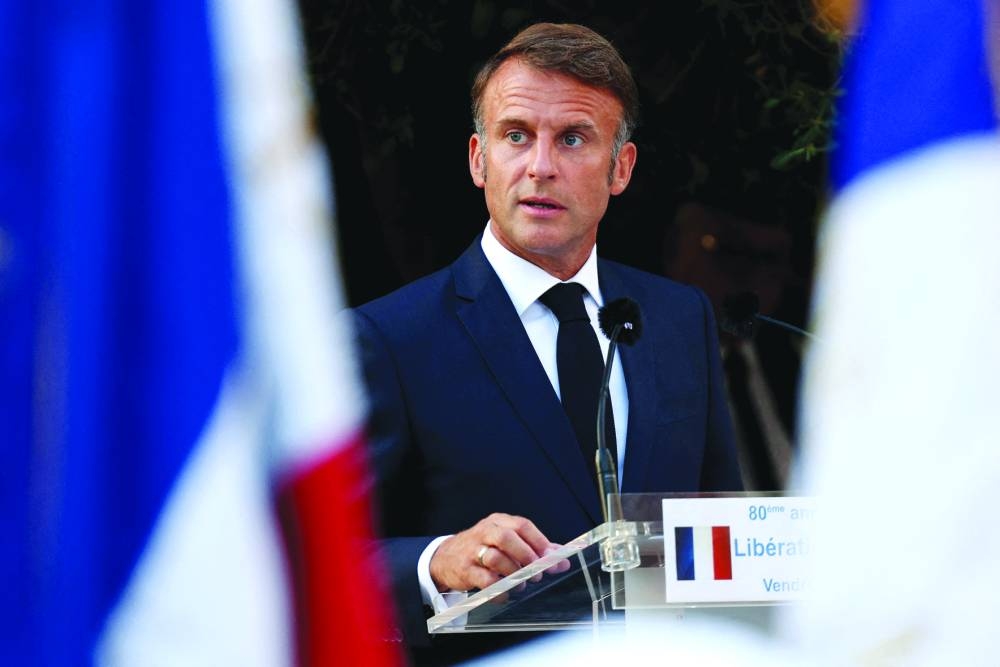French President Emmanuel Macron (pictured) began a round of thorny consultations with political leaders yesterday, hoping to cobble together a viable ruling coalition after last month’s inconclusive election.
A full six weeks after a snap election in which Macron lost his relative parliamentary majority, he has still not named a new prime minister, whose first major task will be to submit next year’s budget plan to the National Assembly.
The left-wing New Popular Front (NFP) – which emerged as the largest bloc post-election – has said that it wants the 37-year-old economist Lucie Castets to be the new premier.
However, Macron’s forces have shown little interest in the idea, preferring a potential alliance with the traditional right.
“We have come here to remind the president how important it is to respect the election result and to pull the country out of paralysis,” Castets said as she arrived at the Elysee palace yesterday, accompanied by other NFP representatives.
She and her allies were willing to find a “compromise, given that nobody has the absolute majority” and would work towards “stability”, Castets said.
Also ahead of the meeting with Macron, Manuel Bompard, co-ordinator of the hard-left France Unbowed (LFI) party, had warned: “We’re not going to negotiate with him”.
Instead, he announced, “we’ll tell him that there is no alternative to Lucie Castets’s appointment”.
Allies of Macron – who said after the election that “nobody won” – have argued that the leftist bloc is too weak to claim the prime minister’s post, and are hoping instead to form a majority around a centrist figure.
As she left the Elysee, Castets told reporters that while Macron was “lucid” about voters’ “wish to change political direction” she had nevertheless detected “a temptation for the president to build his own government”.
Macron told members of his own camp at a later lunch that voters had sent a “message of change” but not a “complete disavowal” of his leadership, according to people in the room.
He added that he was looking for an “institutionally stable” government able to survive a no-confidence vote in parliament, the people added.
Castets had earlier said she was “ready to build coalitions, starting today”, and to talk with the other political groups.
However, the traditional conservative Republicans party vowed yesterday that it would vote to bring down any government including LFI.
“It’s a fact that the president acknowledges the legitimacy” of the left, a source close to Macron told AFP.
“They’ve been elected. He invited them first. The question is about their capability” to produce a government that would not immediately be toppled, the person added.
The current period is the longest France has ever been without a head of government following a legislative election, after Macron said he would not prioritise the task of finding one during the Paris Olympic Games, which ended on August 11.
Prime Minister Gabriel Attal has been running a caretaker government.
Opposition figures have sharply criticised Macron for taking so much time, with Green Party senator Yannick Jadot calling the president’s stance “a denial of democracy”.
Even some of Macron’s own allies have become impatient.
An official in his office insisted on Thursday that “the president is on the side of the French people, the guarantor of the institutions”.
The Elysee talks – scheduled for yesterday and Monday – include representatives from across the political spectrum.
Macron’s office did not give an indication of when the president might make his choice for prime minister, but observers expect him to do so sometime next week.
Whoever is appointed must be able to survive a confidence motion in parliament and present a 2025 budget draft law to parliament by October 1, the legal deadline.
Macron has a history of coming up with unexpected prime ministers.
The French Constitution says that he is free to name who he wants – however, they need to be able to survive no confidence votes from the opposition.
Some possible candidates include a conservative regional president, Xavier Bertrand and former Socialist Prime Minister Bernard Cazeveuve, sources have said. French media recently mentioned Karim Bouamrane, the Socialist mayor of an impoverished Paris suburb, as another possible name.

French President Emmanuel Macron
